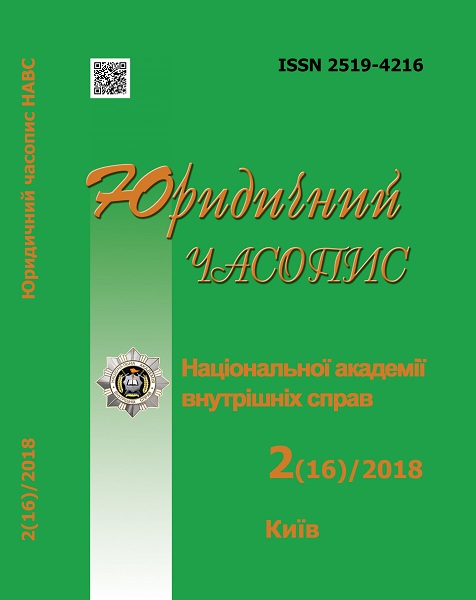Principles of Formation of the Evidence Base when Considering the Anti-Corruption Legislation by the Constitutional Court of Ukraine
Abstract
The article is devoted to issues related to the process of formation of the evidence base in the consideration of the Constitutional Court of Ukraine case concerning anti-corruption legislation. The author, having examined the practice of the Constitutional Court of Ukraine in resolving issues of constitutionality of the provisions of the laws of Ukraine in the field of combating corruption offenses, has paid special attention to the peculiarities of the process of formation of legal positions of the Court regarding the constitutionality of the provisions of these laws challenged by the subjects of the right to appeal to the Constitutional Court. According to the results of the research, the author makes the following conclusions: Corruption is a socio-political phenomenon, conditioned, first, by the imperfection of the functioning of state and social institutes, a peculiar reaction of the individual to the defects of society. The negative impact of corruption is not limited to harming the economic and political interests of society; it is a psychological phenomenon that destroys the centuries-old achievements of human civilization in the areas of morality, legal culture and respect for the principles of democratic, legal and social order of public life. The state not only has the right but also must take effective measures to combat this antisocial phenomenon. To effectively overcome corruption as a socio-political phenomenon and unlawful act, only the formation of an appropriate legislative framework is required all elements of an anti-corruption national mechanism (legislative, executive, judicial) and public control should be involved. The role and place of the Constitutional Court of Ukraine in the implementation of anti-corruption legislation determine its authority to decide on the constitutionality of the provisions of acts of this legislation. The general legal positions of the Court formulated in decisions on cases of anti-corruption legislation are, in particular, as follows: restriction of certain rights and freedoms of persons by the provisions of acts of anticorruption legislation is lawful, provided that such restrictions apply only in cases and in the amount provided for by the Basic Law of Ukraine; activities of state authorities, local self-government, their officials and officers, both law-enforcement and law enforcement agencies, including those on combating corruption, should be exercised solely on the basis of, within the limits of authority and in the manner prescribed by the Constitution and laws of Ukraine.
Downloads
Abstract views: 144 PDF Downloads: 55
Copyright (c) 2019 Law Magazine of the National Academy of Internal Affairs

This work is licensed under a Creative Commons Attribution-NonCommercial-NoDerivatives 4.0 International License.
- Authors reserve the right to authorship of their own work and transfer to the magazine the right of the first publication of this work under the terms of the Creative Commons Attribution License, which allows other persons to freely distribute published work with mandatory reference to authors of the original work and the first publication of an article in this magazine.
- Authors have the right to enter into separate additional agreements on non-exclusive dissemination of the work in the form in which it was published in the journal (for example, to post an article in the institution's repository or to publish as part of a monograph), provided that the link to the first publication of the work in this journal is maintained.
- The journal's policy allows and encourages the posting of articles by authors on the Internet (for example, in electronic storehouses of institutions or on personal websites), both before the submission of this manuscript to the editorial office and during its editorial processing, as this contributes to the creation of a productive scientific discussion and positively affects the efficiency and dynamics of citing the published work.




